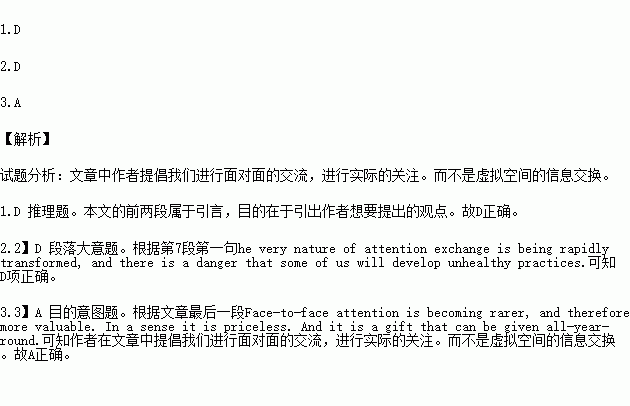题目内容
The malls were filled with people seeking gifts for their loved ones. Some of the malls remained open around the clock, partly to satisfy our needs to buy gifts.
Behind the materialistic aspect of shopping for gifts lies the idea of caring, being attentive to the desires of special people in our lives. However, to use a well-worn play on words: it is our presence, not our presents, that truly counts. Many of us, unfortunately, can be so inattentive, even in the presence of our loved ones, that we might as well not be there at all.
Attention is one of the greatest gifts we can give each other. Companies around the globe spend billions every year on advertising to catch our attention for just a short moment at a time. Whole industries — media, entertainment, education — rely on the precious gift of our attention for their continued existence. A baby lacking attention for a long time is likely to be psychologically unhealthy.
In earlier times, both diet and attention could be left unregulated (没人管的) without major cause for concern. There were natural checks and balances: limited availability of food meant few got fat, for example. Similarly, in bygone times we might have spent a few hours communicating with the village storyteller; today, watching an entire TV series, while speaking to nobody, is common. In traditional societies, with smaller population, everyone would get a fair deal of attention. On many issues we might go to see Grandma or Grandpa; now we have Google and Wikipedia.
“She just wants attention.” people tend to think little of those doing things simply for attention. But the truth is that human beings need attention, and giving attention to each other is, to a large extent, what human civilization is based upon. This perhaps explains the runaway success of social networking sites such as Twitter and Facebook. While we use such sites for “micro Hogging”, “idea voicing” and “status updates” — the reality is that we are often doing no more or less than fulfilling our basic human drive for attention exchange.
I friend you, you friend me, I retweet you, you retweet me. The charming ease with which we can now get and give attention is why many people appear overly attached to their smartphones. It is also a vicious (恶性的) circle. As ever more people are busy exchanging attention online, there is increasingly less attention to be paid in the real world, which forces more people to seek their attention exchange online, or else risk attention-starvation.
The very nature of attention exchange is being rapidly transformed, and there is a danger that some of us will develop unhealthy practices. Just as eating red meat every day is a bad idea, so it is with too much attention exchange. The biological consequences of our technological advancement in food production are highly visible; heart disease, diabetes and obesity. The consequences of our transformed attention exchanges will be psychological and social, and so may take longer to identify, but they will be equally damaging.
Face-to-face attention is becoming rarer, and therefore more valuable. In a sense it is priceless. And it is a gift that can be given all-year-round.
1.In the first two paragraphs the author __________.
A. offers advice to attention givers
B. analyses the present problems
C. states the necessity of presents
D. puts forward his point of view
2.What can we infer from Paragraphs 6-7?
A. More people will risk attention-starvation in future.
B. The nature of attention exchange is rarely changed.
C. Technological advancement contributes to all diseases.
D. Transformed attention exchanges do harm to society.
3.The writer’s purpose for writing the passage is to __________.
A. advocate more focus on real life attention
B. analyze the necessity of attention giving
C. give practical tips on attention exchange
D. recommend some social networking sites
 轻松课堂单元期中期末专题冲刺100分系列答案
轻松课堂单元期中期末专题冲刺100分系列答案
